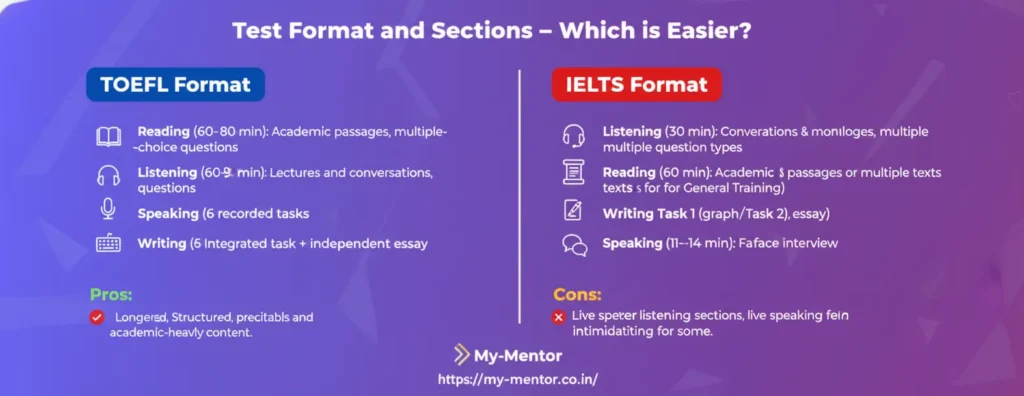Wondering which is easier TOEFL or IELTS? This guide compares both exams in terms of format, scoring, and preparation to help you decide. Learn from real test-taker experiences and find out which test suits your skills best.
Which is Easier TOEFL or IELTS – Detailed Guide for Test-Takers
If you’re planning to study or work abroad, you’ve probably asked yourself: which is easier TOEFL or IELTS? Both exams measure English proficiency, but they differ in format, scoring, and approach. This guide will help you understand everything—from test structure to real experiences—so you can make an informed choice.
At My-Mentor, we help students navigate their study abroad journey, offering personalized guidance on choosing the right English proficiency test. With expert tips and preparation strategies, My-Mentor ensures you pick the exam that fits your skills. Thousands of students trust My-Mentor to achieve their study abroad dreams successfully.
Overview of TOEFL and IELTS
TOEFL, run by the Educational Testing Service (ETS) in the U.S., is ideal for students targeting North America.
IELTS, managed by the British Council, IDP, and Cambridge Assessment English, is recognized globally, especially in the UK, Australia, Canada, and New Zealand.
Both tests assess Listening, Reading, Writing, and Speaking, but understanding their differences is key to answering which is easier TOEFL or IELTS for your own strengths.
Test Format and Sections – Which is Easier?

TOEFL Format
- Reading (60–80 min): Academic passages, multiple-choice questions
- Listening (60–90 min): Lectures and conversations, multiple-choice
- Speaking (20 min): 6 recorded tasks
- Writing (50 min): Integrated task + independent essay
Pros: Structured, predictable, computer-based.
Cons: Longer listening sections and academic-heavy content.
IELTS Format
- Listening (30 min): Conversations & monologues, multiple question types
- Reading (60 min): Academic passages or multiple texts for General Training
- Writing (60 min): Task 1 (graph/letter), Task 2 (essay)
- Speaking (11–14 min): Face-to-face interview
Pros: Shorter listening sections, live speaking feels natural.
Cons: Live speaking can be intimidating for some.
Quick Comparison Table for Which is Easier TOEFL or IELTS
| Section | TOEFL iBT | IELTS Academic | Which is Easier? |
| Reading | 60–80 min, MCQs | 60 min, varied types | TOEFL is easier if you prefer MCQs |
| Listening | 60–90 min, MCQs | 30 min, multiple types | IELTS is easier for shorter sections |
| Writing | 50 min, 2 tasks | 60 min, 2 tasks | Depends on preference |
| Speaking | 20 min, recorded | 11–14 min, in-person | TOEFL is easier for shy speakers |
This comparison helps you answer which is easier TOEFL or IELTS depending on your comfort with computer-based vs live speaking formats.
Scoring System – Which Feels Simpler?
TOEFL: Total 0–120 (each section 0–30)
- Competitive: 80–100; Excellent: 100+
IELTS: Band 0–9 (0.5 increments)
- Most universities require 6.5–7.5; 8+ is excellent
TOEFL’s cumulative scoring can feel easier for those confident across all skills, while IELTS allows strong performance in specific areas, which affects which is easier TOEFL or IELTS for you.
Target Audience – Who Finds Which Easier?
- TOEFL: Preferred for U.S. universities; good for students comfortable with computer-based exams.
- IELTS: Preferred for UK, Australia, Canada, New Zealand; ideal for those confident in face-to-face speaking.
Your comfort with the exam format can influence which is easier TOEFL or IELTS for your situation.
Preparation and Resources
TOEFL Prep
- Official ETS practice tests and resources
- Record speaking answers; focus on academic reading/listening
IELTS Prep
- British Council, IDP, Cambridge official resources
- Practice timed essays, mock speaking interviews, and multiple accents
Proper preparation is key in determining which is easier TOEFL or IELTS based on your learning style.
Test-Taker Experiences – Which Felt Easier?
- TOEFL: “Recording my speaking answers was stress-free; much easier than expected.”
- IELTS: “Face-to-face speaking was nerve-wracking at first but felt natural once I started.”
These experiences show that deciding which is easier TOEFL or IELTS depends on whether you prefer structured computer-based tests or conversational live speaking.
Personal Recommendations – Deciding Which is Easier
- Choose TOEFL if: You prefer computer-based exams, American English, and academic tasks.
- Choose IELTS if: You excel in conversation, can handle varied accents, and target countries outside the U.S.
Knowing your strengths helps answer which is easier, TOEFL or IELTS, for your unique situation.
Conclusion
So, which is easier, TOEFL or IELTS? There’s no universal answer. It depends on your test-taking style, language strengths, and target country. TOEFL may be easier for structured computer-based learners, while IELTS may suit conversational learners. With consistent practice, preparation, and guidance from My-Mentor, you can confidently choose and succeed in either exam.
FAQs – Which is Easier TOEFL or IELTS?
1. Which is easier, TOEFL or IELTS for speaking?
TOEFL is recorded; IELTS is face-to-face.
2. Which is easier, TOEFL or IELTS for writing?
TOEFL mixes reading/listening with writing; IELTS is essay/report style.
3. Which is easier, the TOEFL or IELTS for listening?
TOEFL uses American accents; IELTS has multiple accents and shorter sections.
4. Which is easier, TOEFL or IELTS, to get a high score?
TOEFL suits computer-savvy academic learners; IELTS favors conversational skills.
5. Which is easier, TOEFL or IELTS, for studying abroad?
TOEFL is popular in the U.S.; IELTS is preferred in the UK, Canada, Australia, and New Zealand.